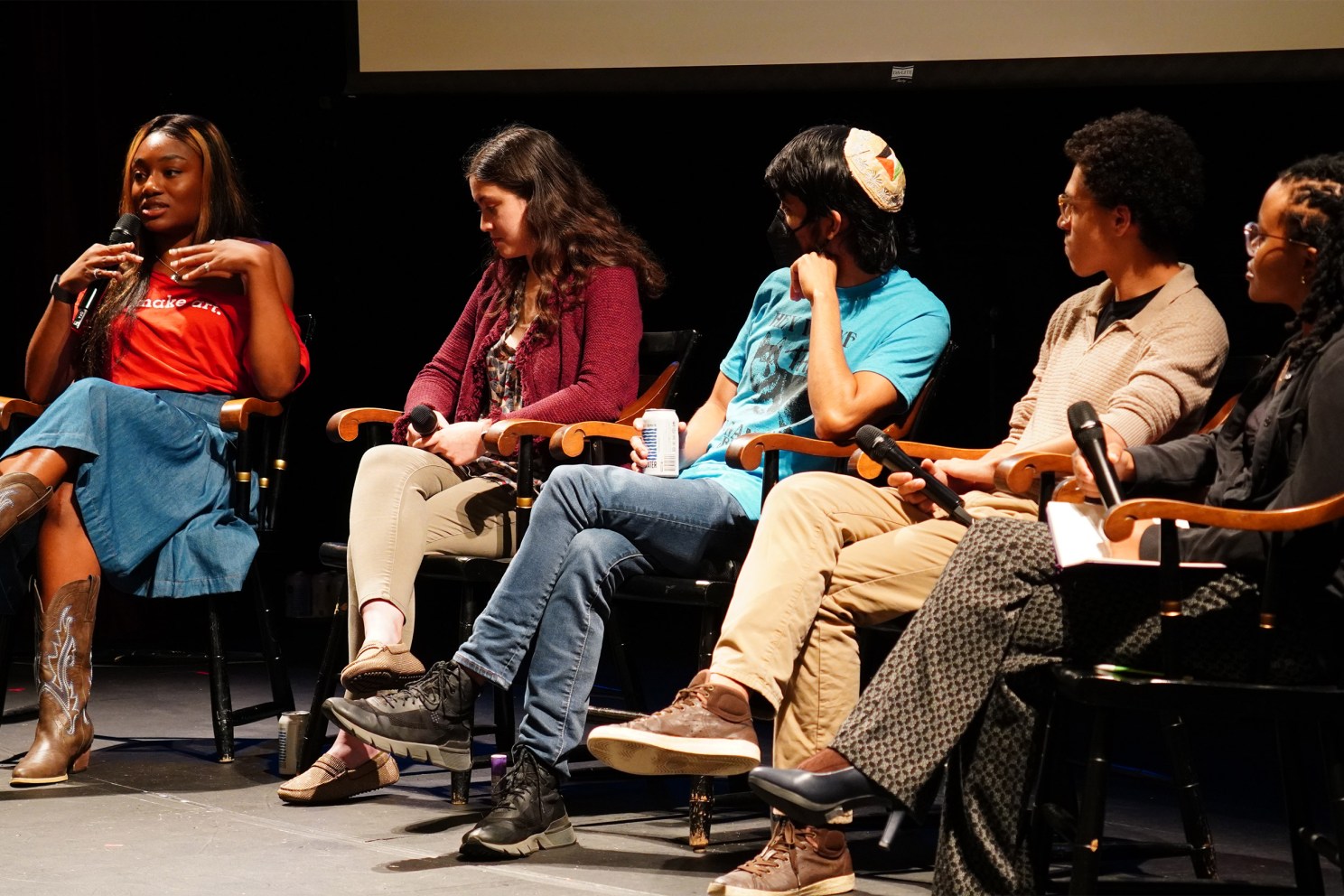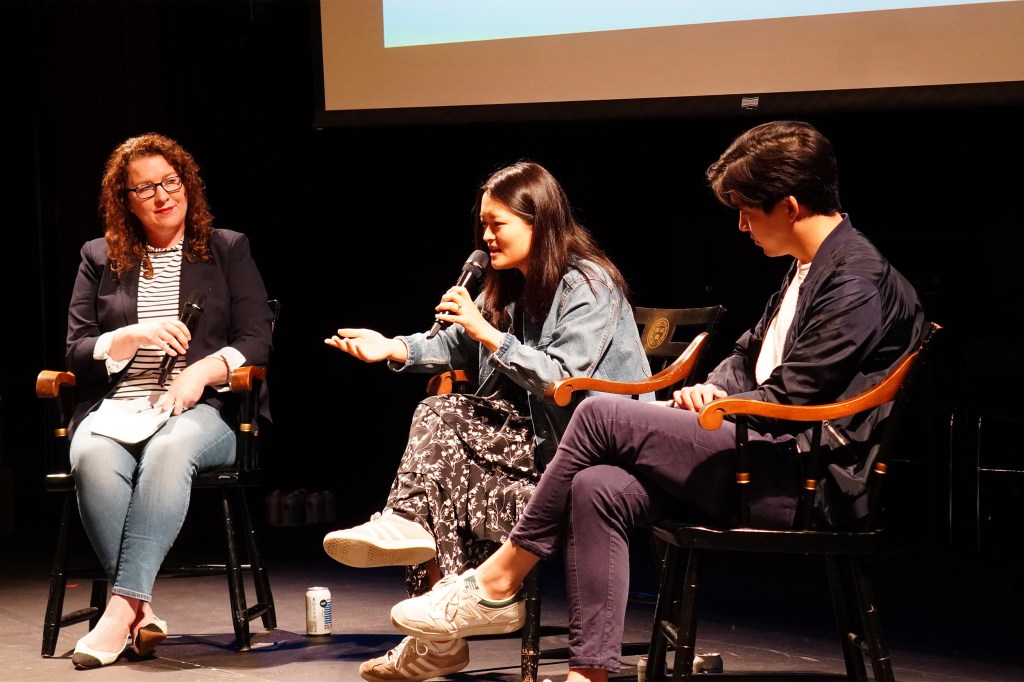Making creation a career

Gabby Anderson ’26 (from left), Veronica Leahy ’23, Abraham Rebollo-Trujillo ’20, and James Caven ’22 discuss their career choices in the arts. Kalya Bey ’25 moderated.
Photos by Marin Gray ’26
Alumni in the arts share insights and lifelong impact of campus involvement
Sometimes all it takes is one small brush with the arts to change a career trajectory.
Kevin Lin ’12 knows this as well as anyone. An Organismic and Evolutionary Biology concentrator at Harvard, Lin was preparing for a career in biology when he made a spontaneous decision junior year to volunteer for an American Repertory Theater production. One A.R.T. internship and one Harvardwood 101 trip later, Lin found himself applying to intern in the theater department of Creative Artists Agency after graduation.
“I figured that, for one last hurrah before going to grad school for biology — which I had already applied to — I might as well do an internship in theater,” he told an audience of students gathered in the Agassiz Theatre last week. Now Lin is an agent, representing theater artists like Leslie Odom Jr. and Darren Criss, Columbia Professor Kimberlé Crenshaw, and Olympic diving champion Tom Daley.
“It was very clear to me that I’m not going to be a writer, I’m not an actor, I’m not a director, but I want to be surrounded by people who are extraordinary,” Lin said. “In my position now, my day is filled with insanely talented people who inspire me on a daily basis.”

Lin was one of the keynote speakers at the inaugural Creative Careers Conference co-hosted by the Office for the Arts at Harvard, the Harvard Alumni Association, and the Mignone Center for Career Success. The conference brought together current students interested in the arts with alums working in the field for a panel discussion and networking reception. The event concluded with a reimagined student performance of “The Human Comedy” (1983), the result of a weeklong musical theater residency with alumni that included Broadway producer Jack Viertel ’71, director Sammi Cannold, M.A. ’16, and arranger Ian Chan ’23.
“I think there are so many extraordinary jobs in the arts that are not super visible,” said Fiona Coffey, director of the Office for the Arts. “When you can see how people have forged these very unique and specific careers, it opens up students’ minds to what’s possible. It gives them permission to dream in a similar way.”
Alumna composer-lyricist and novelist Julia Riew ’22, the other keynote speaker, started at Harvard on the pre-med track. Although she had always loved musical theater, she was intimidated when didn’t see many other Asian American students pursuing the field.
“From freshman fall through junior year I knew I had this theater passion, and I knew that it felt impractical,” Riew said. “I’d literally go home and cry after class every day. I’d be writing musicals in the back of Life Sciences 1B, not listening to the lecture.”
Ultimately Riew decided to jointly concentrate in music and Theater, Dance & Media. Now, she is represented by Lin, and working on projects in musical theater, literature, film, and TV. Riew emphasized to students the importance of using their time as undergraduates to explore their craft.
“There’s this opportunity to make bad theater and put it onstage. I was like, ‘When else, other than College, am I going to be able to write a show and have it go up onstage and not have to spend a dime of my own money?’” she said.
James Caven ’22, a writer’s assistant on “The Tonight Show Starring Jimmy Fallon,” spoke on a panel alongside fellow alumni Abraham Rebollo-Trujillo ’20, a dramaturg and actor, Veronica Leahy ’23, a musician and composer, and current junior Gabby Anderson ’26, a guard on the women’s basketball team and artist and entrepreneur who makes customized sneaker art.
Caven, who was involved in the Harvard Lampoon and the Harvard Radcliffe Dramatic Club while being an Integrated Biology concentrator, spoke to students about the fast-paced realities of comedy writing, which involves producing a new show every day between first pitches at 9 a.m. and the show taping at 5 p.m. Caven said he was encouraged to apply for his position by a fellow alumnus also involved with the Lampoon.
Anderson said balancing her art career with being a student is definitely time-consuming, but she makes it easier by combining the two whenever she can, sometimes submitting paintings (and accompanying essays) for econ class projects.
“I find myself very inspired, not only when I play basketball, but taking courses. Even econ sometimes makes me think, ‘Oh my gosh, I need to make this huge painting about the economic state of the U.S. right now,’” Anderson said. “Because my hobby is also my career, I’m more passionate about it, which motivates me. I’m having fun so it doesn’t necessarily feel like work.”
Students in the audience asked alumni about a range of topics, from how to self-advocate and how to navigate family approval around a career in the arts to how to decide which creative projects to accept or decline.
Leahy, who entered Harvard believing she would study math, was a TDM and music concentrator in the Harvard-Berklee Joint Studies Program. She told students, who were curious about networking, that many of the performance and directing opportunities she has now are a direct result of professional and social connections she made on campus.
“Truly the people that you are making art with now are the people that you might be making art with for the rest of your life, or definitely for the next couple of years,” Leahy said. “Just enjoy it, appreciate it, and really take advantage of being here with all these talented people.”




